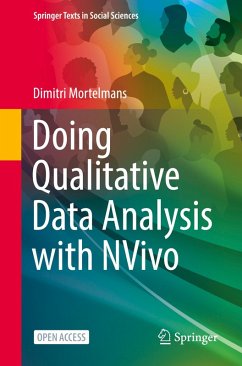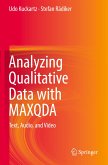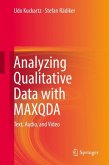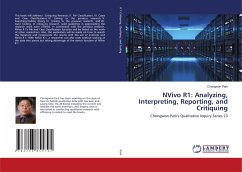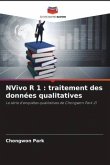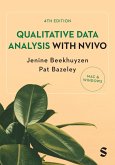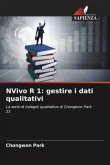This open access textbook provides an introduction to the software program NVivo, the most widely used qualitative analysis program. It is a versatile program with an extensive range of accessible analysis tools, flexibly deployable in the diversity of qualitative analysis approaches.
Qualitative analysis is almost standard practice today with the help of a software program. Yet there are many misunderstandings about qualitative software. They support the qualitative researcher but never take over their manual and theoretical work. An in-depth understanding of the possibilities of a qualitative software program helps to free up time for the analysis itself.
The possibilities of NVivo in this book are approached from a researcher's perspective. That is precisely why gaining efficiency in using the software tools gets a prominent place in the chapters. The author examines basic skills, such as managing data, working with memos and coding qualitative data. This includes textual data (such as transcripts from interviews and focus groups) and audiovisual material (sound, video and images). The book also discusses more advanced analysis tools, such as case coding, queries, AI tools, matrices and models (maps).
This textbook is intended for all users of NVivo, both early career researchers and more advanced analysts, who want to further discover the secrets of this software package along the way.
Hinweis: Dieser Artikel kann nur an eine deutsche Lieferadresse ausgeliefert werden.
Qualitative analysis is almost standard practice today with the help of a software program. Yet there are many misunderstandings about qualitative software. They support the qualitative researcher but never take over their manual and theoretical work. An in-depth understanding of the possibilities of a qualitative software program helps to free up time for the analysis itself.
The possibilities of NVivo in this book are approached from a researcher's perspective. That is precisely why gaining efficiency in using the software tools gets a prominent place in the chapters. The author examines basic skills, such as managing data, working with memos and coding qualitative data. This includes textual data (such as transcripts from interviews and focus groups) and audiovisual material (sound, video and images). The book also discusses more advanced analysis tools, such as case coding, queries, AI tools, matrices and models (maps).
This textbook is intended for all users of NVivo, both early career researchers and more advanced analysts, who want to further discover the secrets of this software package along the way.
Hinweis: Dieser Artikel kann nur an eine deutsche Lieferadresse ausgeliefert werden.

